Pool Care, Explained: A Q&A with Swim University’s Expert
Let’s be real… here in Alberta, Canada, pools aren’t exactly a household staple. With snow on the ground half the year and patio season lasting roughly 3.5 weeks, most of us are more familiar with hot tubs than deep ends. But for those lucky (and brave) enough to have a pool, the upkeep can be a lot. We may be cleaning pros, but when it comes to pool care, we’re diving into the deep end with floaties on. That’s why we teamed up with the experts at Swim University to get the lowdown on what homeowners should actually be doing to keep their pool clean, safe, and swimmable, and when it’s time to call in the pros. Because nobody wants to swim in regret… or algae.
When you buy through our links, we may earn a small commission.
1. Let’s cut to it. How gross is the average homeowner’s pool really? Be honest. Are we swimming or marinating in bacteria soup?
Sure there are always a few pools that are gross, but I think most people do their best to keep their pools clean. However, just because a pool LOOKS clean, doesn’t mean it’s sanitary. You could have a pool that’s crystal clear, but when tested, you’ll find they have no chlorine and their pH is super low making the water highly acidic. Nothing can grow in acid.
2. What are the non-negotiables for weekly pool maintenance? Like, what do we actually have to do, and what can we pretend we did?
- Test your water chemistry – especially pH alkalinity and chlorine levels. This prevents algae and keeps your water safe. (USA) (Canada)
- Skim the surface to remove floating debris. This keeps junk from clogging your filter. (USA) (Canada)
- Brush the walls and floor to prevent algae buildup. Pay attention to corners and steps. (USA) (Canada)
- Empty your skimmer and pump baskets. Full baskets restrict water flow.
- Run your filter for at least 8 hours daily. This keeps water clean and chemicals mixed.
3. You’ve got all the gadgets and gizmos. What’s one or two tools or products homeowners should absolutely invest in (besides a pool boy)?
Hands down a robotic pool cleaner. When I was a kid, my dad refused to buy one. So I was forced to manually vacuum the pool and hated it. This gadget is a game changer. (USA) (Canada)
4. We’re cleaning pros, but pool chemistry feels like high school science class trauma. Can you explain it like we’re five… or slightly hungover?
- Start with testing. Use test strips to check your water each week.
- First fix your total alkalinity. It should be between 100 and 150 PPM. This helps everything else stay balanced.
- Next fix your pH. It should be between 7.4 and 7.6. Think of this as how comfortable the water feels on your skin and eyes.
- Finally check your chlorine. Keep it between one and three PPM. This kills the germs.
- Test once a week. Add chemicals in that order: alkalinity then pH then chlorine.
5. How do we know when it’s time to call in the big guns? (That’s you.) Like, is green water ever a DIY moment?
Whenever you’re dealing with water and electricity (or gas). I believe everyone can DIY the rest.
6. Is it true that people clean their houses more often than their pools? Because… yikes. Tell us what happens when people neglect pool cleaning for too long.
I believe that’s true. The house gets a lot more use. Your pool’s filter system is doing most of the work. Imagine if your house had a system that kept the air clean, picked up after everyone, and vacuumed the floors. You’d barely clean (except the toilets). This is what a pump, filter, and robotic cleaner does. So you don’t need to clean the pool as often as your home. I don’t have kids, so my house is pretty clean all the time. That would be like having a pool with ZERO trees around. But if you live around a lot of trees, it’s like living with kids (I assume).
7. Pool filters: are we cleaning them enough or nah? (Also, what even is “enough”? Weekly? Monthly? When the water starts looking like soup?)
You should clean your filter by the pressure gauge. That’s what it’s for. When the pressure rises, it means your filter is full of debris. When it’s 10 PSI over the normal running (clean) pressure, then it’s time to backwash or clean.
8. What’s the #1 mistake homeowners make when trying to maintain their own pool? Go ahead. Drag us.
The biggest mistake pool owners make is not testing their water chemistry often enough. Poor water testing leads to unbalanced chemistry which can cause algae growth and damage to your pool equipment. According to The Pool Care Handbook we wrote, you should test your water at least once a week during swimming season. And test more if you have water issues or after heavy rain or use. Regular testing helps keep pH and chlorine levels in the right range which prevents most pool problems before they start.
9. Is there such a thing as a low-maintenance pool or is that just pool propaganda?
100% yes! A good filter system (a big one) with a variable speed pump, salt system, robotic cleaner, etc. You can be pretty hands off if you invest in the right equipment. But for those who don’t have that luxury, I think cleaning a pool by hand can be very zen and relaxing. Think of vacuuming your pool like tending a Japanese dry garden.
10. Final plea: give us a seasonal checklist or something. What should homeowners be doing in spring, summer, fall… and dare we say, winter?
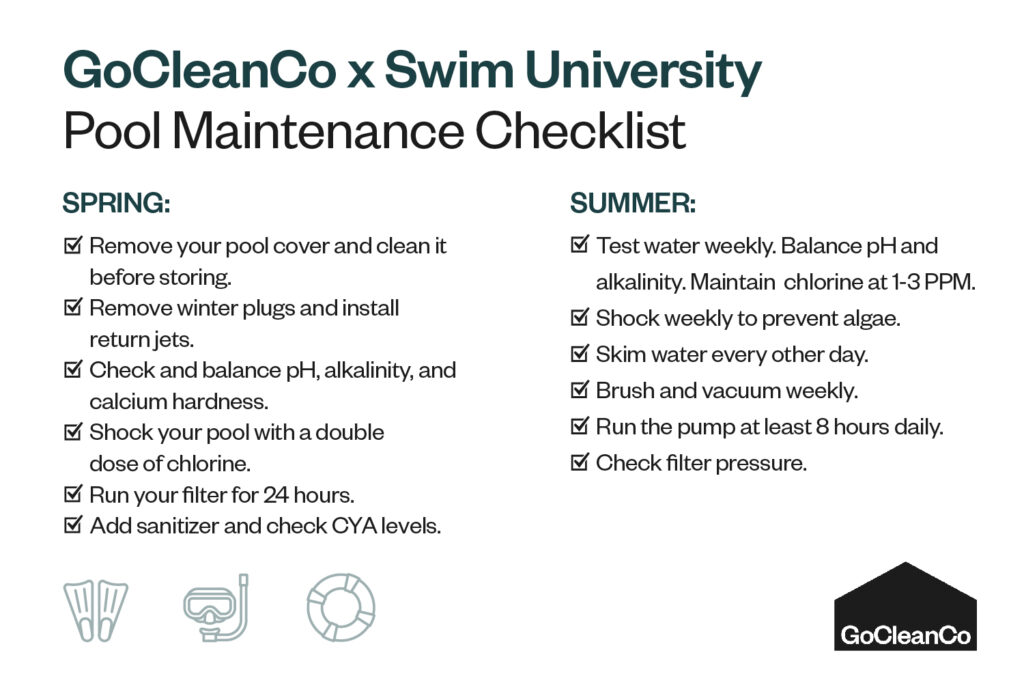
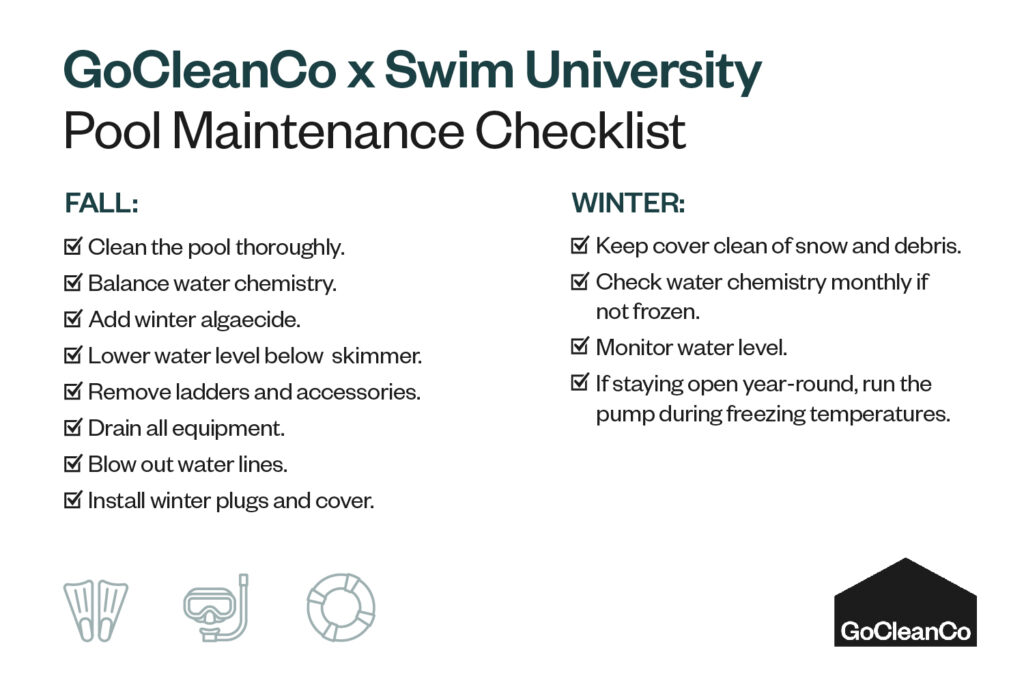
If you’ve got a pool, you want to treat it right. While it might feel like a lot (especially if high school chemistry wasn’t your thing), with a few key habits and the right tools, pool care can be less stress, more splash. Keeping your pool clean and safe is totally doable. And hey, if nothing else, let’s all agree to never swim in bacteria soup again.
To learn more about pool care, check out Swim University where you spend your time online: Facebook, TikTok, Pinterest, YouTube, Instagram, or their Website.
Becky @GoCleanCo



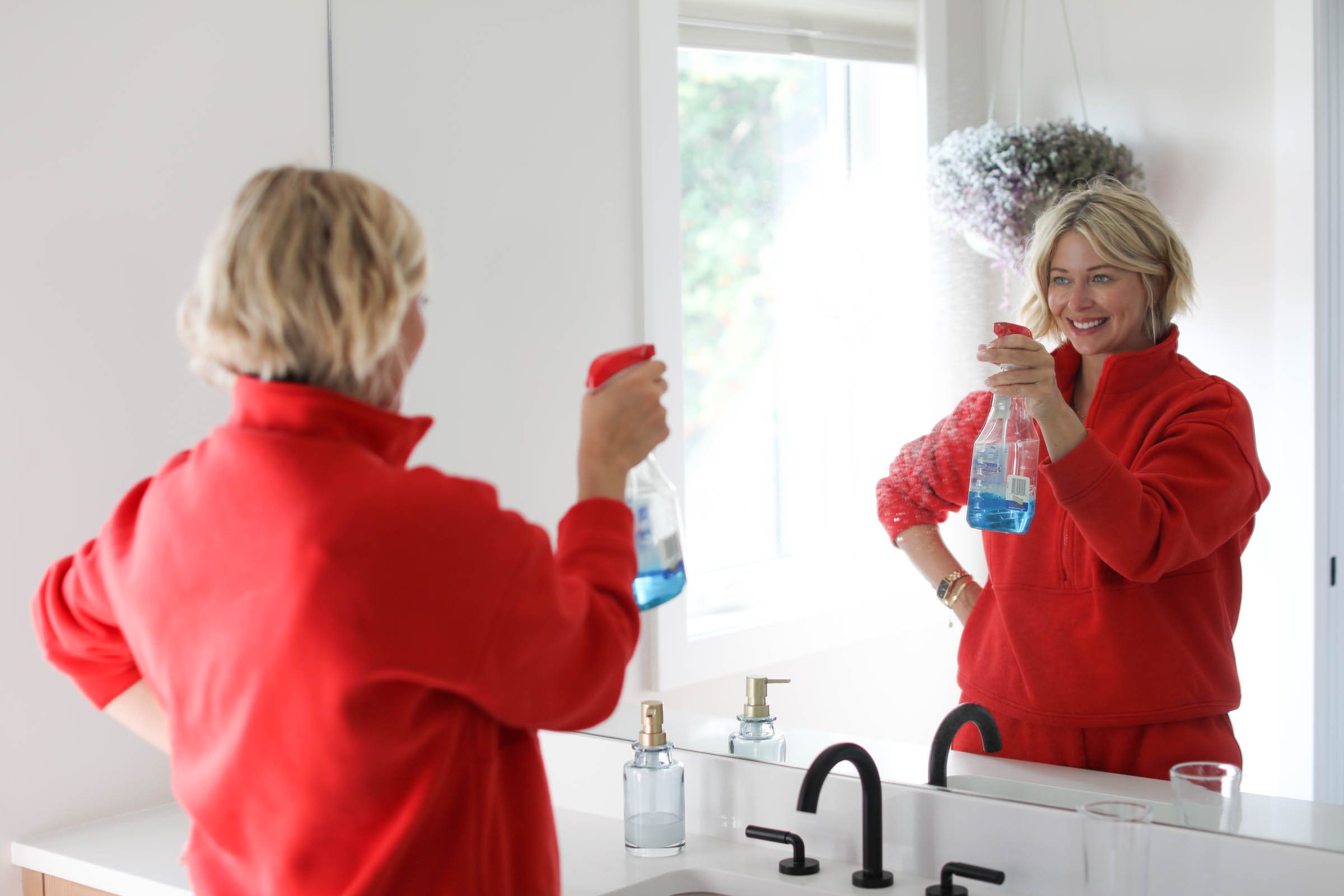
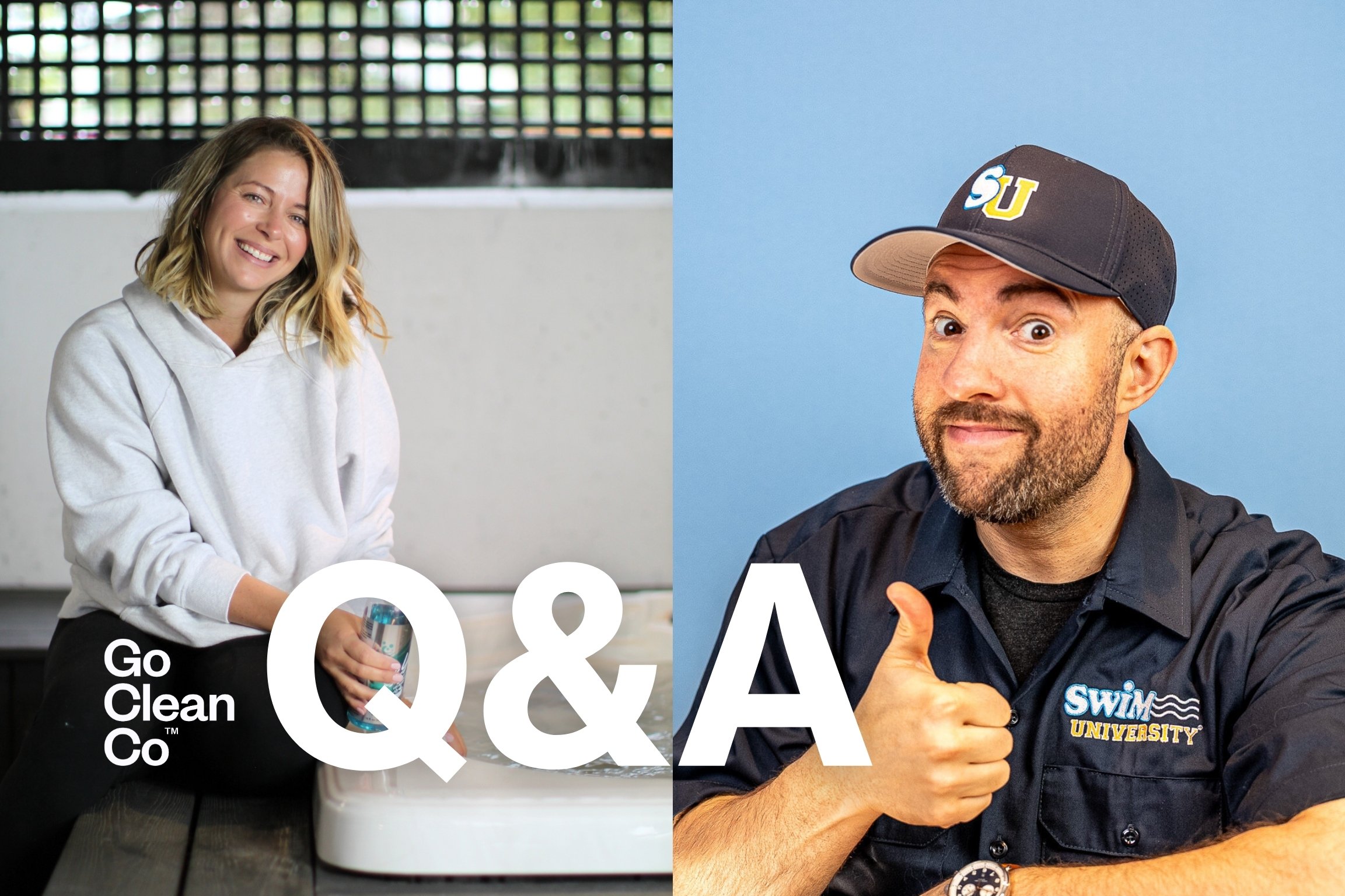


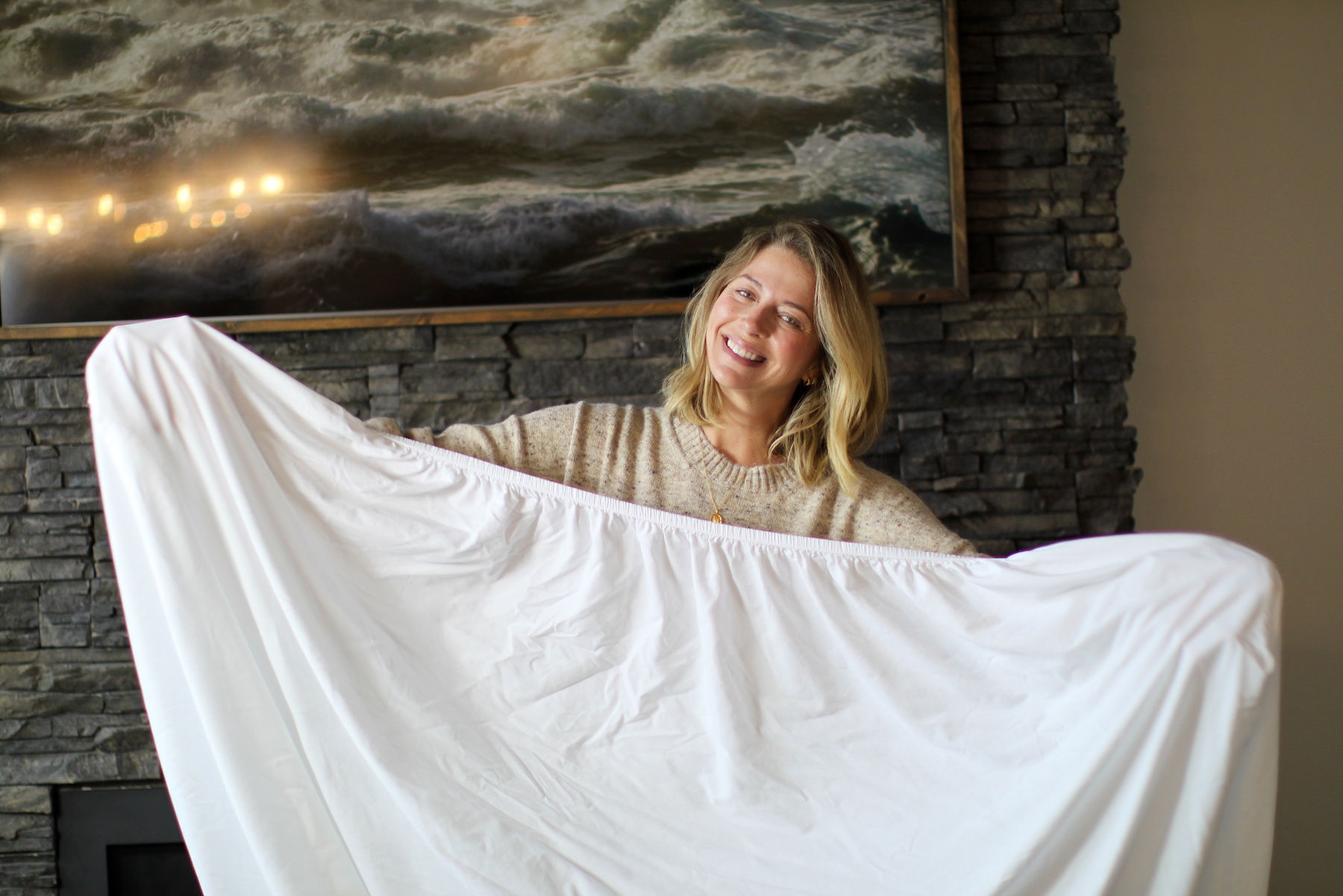
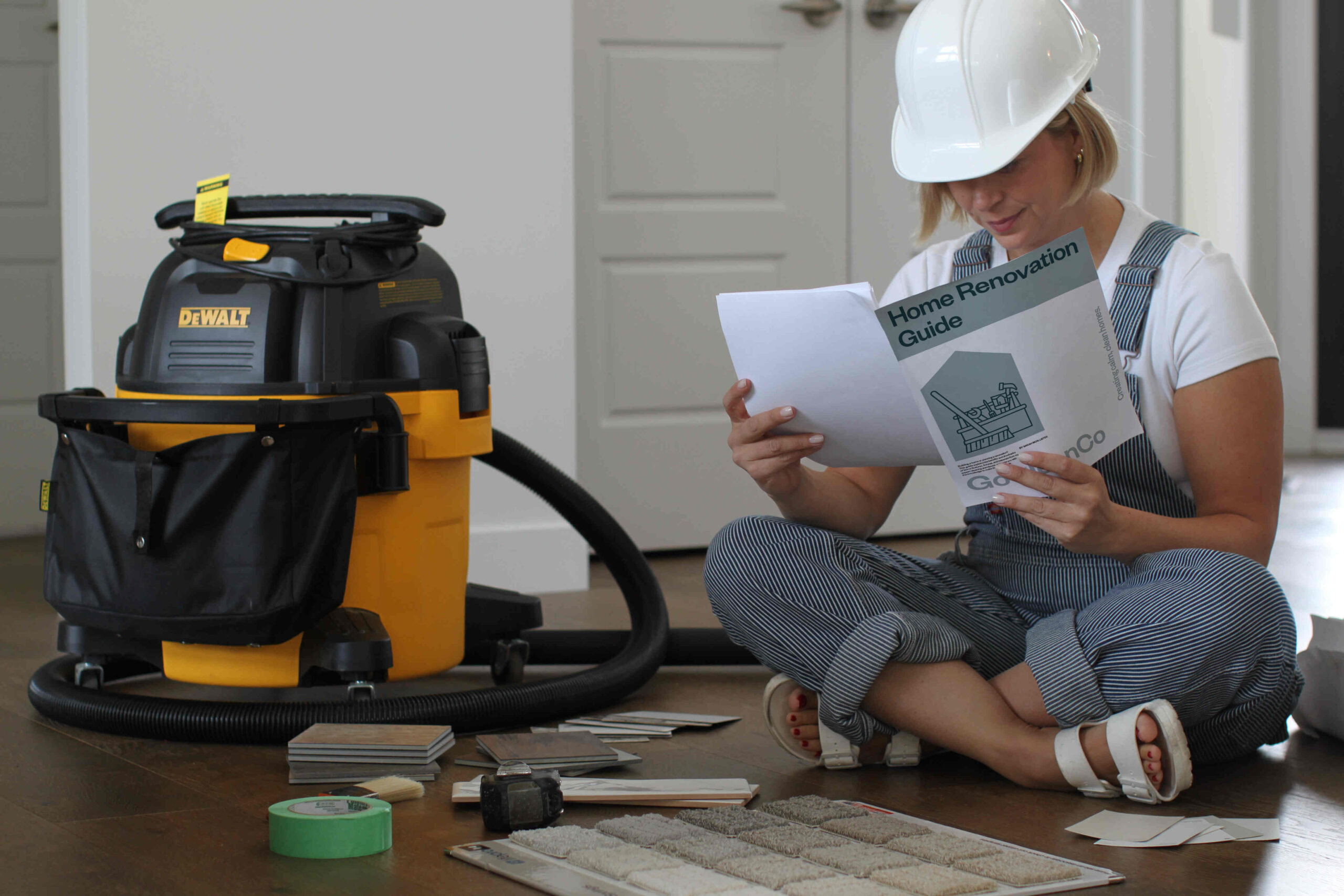

We're big on Instagram.
Follow @GoCleanCo for seriously satisfying videos and top-secret tips. Don’t be shy, come say hi.
gocleanco
494 2,459,648
Creating calm, clean homes.
Cleaning expert plus I do some other stuff which is always a wild ride
Comment link below and I’ll send you the link for the Zing and the brush attachment. The Bissell Zing is one of my favourite vacuums that comes in under $100 in both Canada and the US. You cannot beat this price for the suction and power this thing packs. It’s light weight enough to carry around, lift up high (or low) to get into hard to reach places, and the filter is washable, the canister is easy to empty. I pair it with the hair brush (you have to order it separately!) for dusting baseboards, bathrooms, shelves, basically everything. This vacuum is for hard floors only: It does not have a beater bar for carpets. Only downfall it has is that the cord is a little short and the stick floor attachment sometimes falls out so you have to ram it in there. For under $100 you can’t have it all but honestly this is as close as it gets for me.
Comment link below and I’ll send you the link for the Zing and the brush attachment. The Bissell Zing is one of my favourite vacuums that comes in under $100 in both Canada and the US. You cannot beat this price for the suction and power this thing packs. It’s light weight enough to carry around, lift up high (or low) to get into hard to reach places, and the filter is washable, the canister is easy to empty. I pair it with the hair brush (you have to order it separately!) for dusting baseboards, bathrooms, shelves, basically everything. This vacuum is for hard floors only: It does not have a beater bar for carpets. Only downfall it has is that the cord is a little short and the stick floor attachment sometimes falls out so you have to ram it in there. For under $100 you can’t have it all but honestly this is as close as it gets for me. ...
🫠🫠🫠
🫠🫠🫠 ...
GO-GO-GADGET ARM @swiffer
GO-GO-GADGET ARM @swiffer ...
Honestly we coulda kept going. ✨
Honestly we coulda kept going. ✨ ...
We took a poll and these are the most requested things Moms want for Mother’s Day. Did we miss anything? Send this to the people in your life who know how to make it happen! Also….most of these things are free—they just take some effort.
We took a poll and these are the most requested things Moms want for Mother’s Day. Did we miss anything? Send this to the people in your life who know how to make it happen! Also….most of these things are free—they just take some effort. ...
Sneaky surprise clean for my Mom for Mother’s Day! She deserved this so much, she has scrubbed a lot of houses with me over the years. Many of you may not know this but my Mom has tagged along and helped with cleaning and training the team since day one. She knows the entire team inside and out and we all love to call her “Mom”. She taught me how to clean, how to run a business and most importantly, how to stand on my own two feet. Then I took everything she taught me and turned it into ✨ THIS ✨
Happy Mothers Day Mom @sarahsmomtrudy
Sneaky surprise clean for my Mom for Mother’s Day! She deserved this so much, she has scrubbed a lot of houses with me over the years. Many of you may not know this but my Mom has tagged along and helped with cleaning and training the team since day one. She knows the entire team inside and out and we all love to call her “Mom”. She taught me how to clean, how to run a business and most importantly, how to stand on my own two feet. Then I took everything she taught me and turned it into ✨ THIS ✨
Happy Mothers Day Mom @sarahsmomtrudy ...
By popular request, I tried out the newest the new Mike Washoksi! He did not disappoint. This little pressure washer packs a big punch of power and cleaned up years of grime from this deck in about 20 mins. Now what else can I pressure wash 🤔 😈 Comment: Link and I will send the link to you IN DM!
By popular request, I tried out the newest the new Mike Washoksi! He did not disappoint. This little pressure washer packs a big punch of power and cleaned up years of grime from this deck in about 20 mins. Now what else can I pressure wash 🤔 😈 Comment: Link and I will send the link to you IN DM! ...
🪄✨
I used Mr. Clean undiluted, sprayed it on and let it sit for about ten minutes, scrubbed and wiped it off well to rinse. Letting your cleaning products sit is part of the process, they do a lot of the heavy lifting for you. I think many of us get discouraged with cleaning products because we spray and wipe immediately with minimal results…dirt and grease needs time to soften and break down before you can remove it. However, there is always a little bit (or a lot) of elbow grease required, nothing in life is free 🙃
🪄✨
I used Mr. Clean undiluted, sprayed it on and let it sit for about ten minutes, scrubbed and wiped it off well to rinse. Letting your cleaning products sit is part of the process, they do a lot of the heavy lifting for you. I think many of us get discouraged with cleaning products because we spray and wipe immediately with minimal results…dirt and grease needs time to soften and break down before you can remove it. However, there is always a little bit (or a lot) of elbow grease required, nothing in life is free 🙃 ...